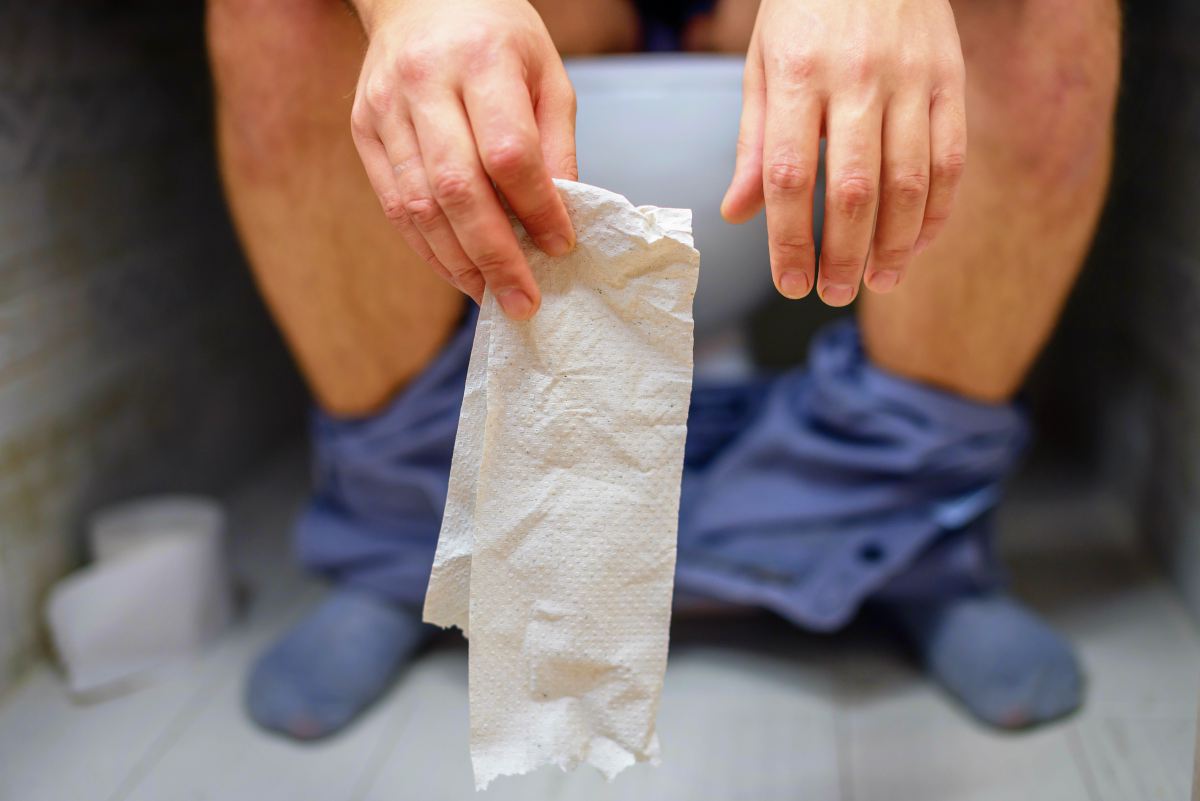Learn how increasing your fluid intake with Tyent water can help relieve constipation.
RELATED: Probiotics | 4 Health Benefits
In this article:
- What Is Constipation?
- What Are the Common Symptoms of Constipation?
- What Are the Causes of Constipation?
- Who Is at Risk of Constipation?
- When Is the Best Time to Seek Help?
- How Do You Treat Constipation?
- Why Should You Manage Liquid Intake?
- Where Can I Get the Best Water to Drink?
Learn How a Boost in Fluid Intake Can Resolve Your Constipation
What Is Constipation?
To understand the role of proper fluid intake, it’s important to know more about constipation.
Constipation is a condition affecting the digestive system characterized by hardening of the stool. It makes expelling feces difficult.
It can be acute, which means it occurs suddenly and may go away after a few days, or chronic, in which case it is persistent.
This persistence doesn’t need to be successive, but the occurrence must be more frequent than usual. The problem should also be going on for at least three months prior to the diagnosis.
Constipation may also be a symptom of an underlying condition. Managing or treating it may help relieve the digestive problem.
What Are the Common Symptoms of Constipation?

You may be experiencing constipation if you have one or more of the following symptoms:
- Feeling of fullness in the colon
- Frequent trips to the bathroom without passing stool
- Feeling of incomplete evacuation even after expelling fecal matter
- Straining, which may lead to injury to the rectum and bleeding
- Feelings of anxiety every time you think about going to the bathroom
- Passing hard or lumpy stool
- Pressing the abdomen to help the body get rid of the stool
- Needing laxatives to help pass the stool
- Abdominal pain
What Are the Causes of Constipation?
Constipation can happen for a wide variety of reasons. Here are some of the most common explanations for the condition:
1. Dehydration
Dehydration is a condition wherein the body’s internal water supply is not enough for different functions. It includes getting rid of waste.
When a person is dehydrated, there isn’t enough water in the small and large intestines to push excreta out into the rectum. This results in constipation.
2. Low Fiber Intake
Fiber is helpful in releasing impacted stool. It works by making the feces bulky and attracting or retaining more water in the intestine to trigger excretion.
What Is Impacted Stool? It is a hard and dry stool that gets stuck in the rectum or colon.
3. Pregnancy
Constipation may occur during pregnancy. It affects between 11 and 38 percent of women, especially those in their early weeks.
It’s due to the increased production of progesterone, the hormone that helps prepare the body for the baby’s growth by thickening the lining of the uterus. It prevents the intestinal muscles from contracting effectively.
Try drinking Tyent water to help improve digestion during pregnancy!
4. Traveling
Traveling can create digestive-related changes. These include the timing of the meals, access to water and fiber, and type of diet.
5. Hypothyroidism
Hypothyroidism causes the body to produce fewer thyroid hormones. When this happens, the metabolism becomes sluggish.The release of the stool, then, may also take longer than before.
6. Blockage
A person may be having difficulty passing stool due to a blockage somewhere in the colon, which spans five feet long. Doctors call this condition as intestinal obstruction.
Some of the common causes are:
- Inflammatory bowel disease, such as Crohn’s disease
- Development of fibroid tissues, usually after surgery of the colon
- Presence of polyps or a tumor, which can be malignant (cancerous) or benign
- Twisting of the colon
- Hernia, or the protrusion of a part of the colon from the muscle that contains it
- Diverticulitis, or the inflammation of the small pouches that line the digestive tract
- Stool impaction
7. Hemorrhoids
Hemorrhoids or piles are swollen veins around the anus and rectum. They can occur due to straining during bowel movement.
They may also worsen constipation as they can be both uncomfortably painful and may discourage you from passing stool.
Who Is at Risk of Constipation?
Anyone can develop constipation, but the risks may be higher among the following:
- Those who are pregnant
- Sedentary individuals
- People who eat a lot of meat and processed food
- Those who don’t drink enough fluids, including water
- People who have the above-mentioned underlying conditions
- Children, due to less knowledge of toilet training and dietary changes
- People who don’t eat enough fiber
RELATED: Hydration Helps: How Better Hydration Can Improve Your Life
When Is the Best Time to Seek Help?

A person who isn’t able to pass stool for three consecutive days may consider seeing a general practitioner. It may also be necessary to see a doctor immediately if constipation occurs with the following signs and symptoms:
- Abdominal pain
- Unexplained weight loss
- Loss of appetite
- Fast heart rate
- Headaches
- Nausea and vomiting
- Persistent urge for a bowel movement
- Inability to pass stool even after increasing fluid intake
These may be a sign of stool impaction, which can have life-threatening complications.
How Do You Treat Constipation?
Fortunately, constipation is easy to treat, especially if you recognize the problem early. You may be able to avoid it through the following:
1. Treatment of the Underlying Cause
If you have the preexisting conditions mentioned above, it’s best to receive the appropriate treatment for them first. Usually, managing them also improves bowel movement.
2. Increased Intake of Fiber
According to the American Dietetic Association, the ideal recommended daily dietary fiber depends on age.
Women below 51 years old should consume 25 grams of fiber every day; men should eat more at 38 grams. Older men and women can eat less at 21 and 30 grams daily.
To meet these requirements, experts suggest eating at least two cups of whole foods rich in fiber. Note, though, there are two kinds:
- Soluble fiber dissolves in water, forming a gel-like structure. It is necessary for regulating the absorption of nutrients and glucose (the body’s source of fuel).
- Insoluble fiber helps harden the stool and retains fluid. Foods rich in it include potatoes, green beans, wheat bran, and cauliflower.
Note: Don’t eat too much fiber either. It may worsen your constipation, or it may lead to diarrhea.
3. Exercise
The walls that surround the colon are muscular, and like other muscles, they also need exercise. Even a brisk walk for about 10 to 15 minutes can stimulate them to contract, helping the wastes move faster from the colon.
The experts, though, suggest waiting for at least an hour after a heavy meal before working out.
The gastrointestinal tract depends on the amount of blood flow reaching it to do its work. If you exercise prematurely, you are redirecting the blood to your other muscles and heart.
4. Relax
Do you know your mindset can also affect your digestive system? The intestines are “sensitive” or responsive to emotions.
If you feel fear, anxiety, or panic, your body may react. It may make it difficult for you to pass stool.
Before heading to the toilet, take deep long breaths and relax.
Why Should You Manage Liquid Intake?
The simplest way to manage constipation is to increase your normal fluid intake. After all, the reason for the condition may be dehydration.
What’s the recommended fluid intake? Some health experts believe you need to drink at least eight glasses of water each day.
Others advise a liquid intake that corresponds to one’s weight. It may also be according to the level of physical activity.
For example, you may have to drink more water if you are sweating a lot or exposing yourself to the sun. In the end, you need to listen to your body.
Where Can I Get the Best Water to Drink?
Water comes in many different forms, and with constipation, the best choice may be hydrogen water. It will boost the emptying period of the colon since it can use the hydration atoms more quickly.
It will also help replenish the electrolytes you don’t have due to dehydration.
Getting hydrogen water is easy. All you need is a water ionizer, which infuses your ordinary water with more hydrogen atoms.
Bowel movements can differ from one person to another. On average, it’s still normal to pass stool at least three times a week.
Besides working with your doctor, improve your digestive health by increasing your fluid intake. Drink more hydrogen water to speed up the emptying process and add more electrolytes to your system.
What are your tips in increasing fluid intake? Share them in the comments section below!
Up Next:









